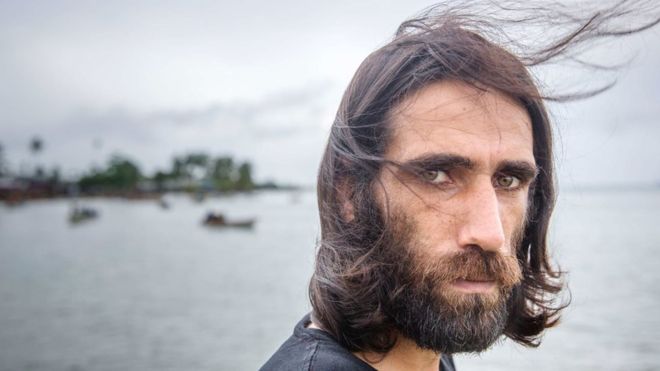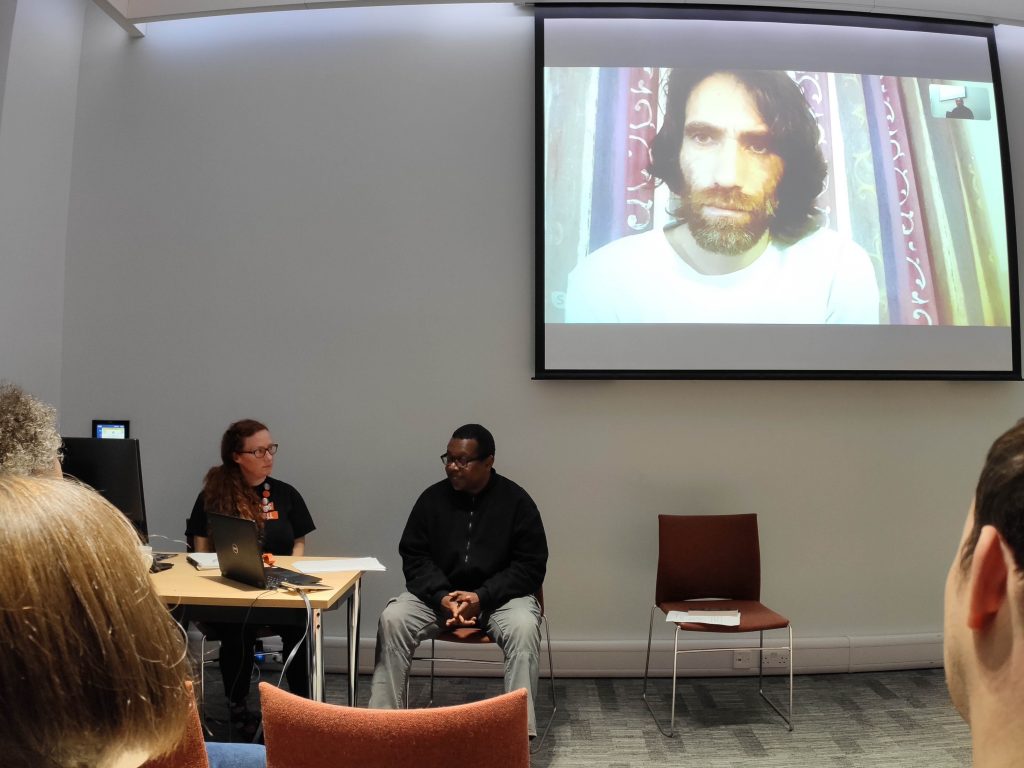
On 19th and 20th February 2020, These Walls Must Fall campaigners in Sheffield and Leeds joined author Behrouz Boochani, and translator Omid Tofighian at two events, discussing the writing of Boochani’s extraordinary book ‘No Friend But the Mountains’, a first-hand account of his detention by the Australian government on Manus Island, in Papua New Guinea. After the event, campaigners Victor, Temboman* and Fafa* took part in reflective interviews which are added here as commentary.
*Names changed to protect identities
Boochani joined by Skype link from New Zealand, where he is currently living as a refugee. He talked about his experiences writing the book from detention, which he did through sending words by text message to his translator, through a secret mobile phone he had with him. It really is a story of creating something powerful against all the odds. Fafa reflected on the similarities to his own experiences and of many others,
[Behrouz] represents many people who speak about when they go to detention, how they feel…In French we say ‘la voix de san voix’ (Voice of the Voiceless). [He] speaks for many people. He represents many many people. English detention or French detention, [or Manus] island… You never do a crime and one day they take you. You aren’t in control. You don’t do something bad, you are looking for protection and one day they just put you in this place.
Fafa*
Our campaigner Victor Mujakachi joined Behrouz for a conversation about their experiences of detention, which whilst taking place at opposite ends of the Earth, had many similarities.

I felt a connection with Behrouz. The way he wrote about his experiences in detention. What I really liked about the way that Behrouz spoke and wrote the book…was that he was speaking for many people. He was also representing a lot of people whose experiences will never be told, and in the past were never told at all.
He exposed the ruthlessness and the insensitivity of the system that detains people who need protection simply because they want to manage immigration numbers, in order to please the electorate. So it was really brave of him to do that and it’s something for which I hold great admiration for him for his courage, tenacity, bravery to bring out all those things which a large part of world population don’t know about really, let alone Australians. They believe that their country is a gem of a country, a kind of paradise which welcomes people who’ve got skills that Australia requires, but they are never aware of the dark underbelly of the detention system.
Victor
Temboman, who attended the Leeds event, talked about the use of text messages to get the story out to Omid, Behrouz’s translator.
Being detained, [and] having a telephone which has Whatsapp, it’s actually a crime. You are committing a crime. But he did very very well. He’s world renowned. Through breaking those laws. Had it not been that, we wouldn’t even know about him today. I’m not saying what he did was right, but at the same time today we are actually talking about him.
And he saw similarities between Behrouz and his own situation, which he found to be a source of strength,
With my situation…everything sometimes happens for a reason as well. If this guy wasn’t on that island he wouldn’t have written that book. There are some positive things out of that as well. You have to be proud with the little you have. Nothing can stop you from doing great things.
Temboman*
Campaigner Boucka shared the realities of the UK detention system with the audience. The conditions on Manus Island are echoed in the UK detention system. 25,000 people were detained in the UK last year.
After the event, Omid invited all participants, as well as Diana, the speaker from Asylum Matters in Leeds, and Agatha from These Walls Must Fall in Manchester, and academics involved in the events, to take part in a collaborative journal article. This article is now published as part of a special issue of Community Psychology in Global Perspective, and publicly available to download and read here, and you can download it directly here:
Authors: Behrouz Boochani, Diana Flores, Agatha Sibanda, Victor Mujakachi, Temboman, Fafa, Rosie Huzzard, Lauren Cape-Davenhill, Ala Sirriyeh, Hannah Lewis, Gwyneth Lonergan, Deirdre Conlon, Bruce Bennett, and Omid Tofighian
For the article Temboman, Victor and Fafa went on to discuss the nature of resistance for them and people with experiences like theirs. They discussed the many and complex types of resistance that they embody.
For Fafa*, existing at all, against the odds and impossible circumstances the Hostile Environment creates, presenting himself and being a person who does not fit the expectations of the Home Office is resistance. The rejection of the life you are expected to have is resistance
I don’t get any support. I am not allowed to work. Your life is stopped. People don’t know how you manage your life to survive…I cannot accept the life that I am living. Because It’s not my choice.
Fafa*
I remember one day I went to sign at the Home Office and the lady said “you don’t look like you are suffering”, because I was living at the night shelter. And I laughed. She said ‘you are laughing?’. I said you don’ believe me. What do you want me to do? To cry? You think somebody suffering must be dirty. When I came, I spoke to [a Volunteer who I know] and he told me ‘you must tell her, you take a shower from the river before you come to sign’. (laughing).
Fafa*
Victor agreed with this. He explained,
The fact that we are resisting does not mean we are not affected or pained in the way we live in this country. We are human beings, and human beings is adaptable. This is how we’re able to survive.
When Theresa May said we need to make life difficult as much as possible for people so that they give up, she’s a human being, she doesn’t realise that what she’s doing is to a fellow human being who’s also thinking.
Because the moment you try to find ways of restricting my freedom, I’ll also find ways of surviving. Because I’m also a human being, I’m not an animal. If you lock a dog in here and say I don’t want this dog to get out, it will starve. A human being will find other means of getting out because they’re a human being. They’ll break the window, they’ll break the lock.
Victor
Temboman found power and strength through his volunteering and advocacy for others through his local City of Sanctuary project,
With other refugees and asylum seekers I always try to make them feel good about themselves and feel proud. I do volunteer with [my local] City of Sanctuary. It’s like befriending. It’s not about the language, sometimes you won’t speak the same language. You tell a story. You can feel each other. I always try to tell them your story. I always try to tell the new guys, they will be so stressed and I say ‘you know I am actually getting to 20 years and I am still waiting’. They get shocked, they don’t actually know about how I am surviving. I say be proud with the little you have. We have seen people without limbs and they have smiles and they are living.
Temboman*
All the participants are also actively involved in resistance through campaigning for an end to detention with These Walls Must Fall. Victor talked about his determination to continue fighting, and why campaigning is so important, with other people with experience of detention as well as the wider community,
Being part of this group empowers me really. I’m operating at a disadvantage compared to the ordinary British person who’s got stronger rights than me. So taking part in these organisations gives me that extra power to air my grievances, to speak out, to resist and what have you. To stand up for what I do believe.
Victor
The seventeen years that I have stayed in this country mustn’t be wasted. I’ll never give up and say I’m going back home. I’ll never do that, and that doesn’t apply to me only, it applies to other migrants. Migrants who go through difficult experiences, traumatic experiences, crossing the oceans, crossing seas, only to come here and met by this resistance of being unwanted. What the government should realise is that people who’ve gone through those experiences are tough people. They speak out about what they feel needs to be done about them in terms of protection.
If the government thinks those people are going to turn back and say look because you’re tightening screws or what have you, you’re going to give up, they are in for a good shock.
Temboman said that These Walls Must Fall has a clear role to play in education British communities about the reality of life lived in fear of detention. He hopes that ongoing work can have a positive impact on the views of other parents in his own children’s school. Temboman, as an artist, suggest that work can be done through the performing arts,
That’s [why] these walls must fall to be honest. Where have I made this decision to lock parents in detention, then release them back? This is affecting these kids, some of these kids are British, and it’s not about me. Me, today, my time is actually passing. I’m looking to my kids, they are British, All they know is their dad was not allowed to stay in this country. In their mind they would say this is not right. We don’t expect this kind of harsh environment. They will pass this to their kids as well.
Some people don’t like refugees and asylum seekers. They don’t see the big picture.People don’t know what detention is. I think [we should be] visiting schools. Sometimes it’s not about saying things but doing a play. A play would be very good. I have been thinking about this all the time. When one is not allowed to work, you have to go and report every two weeks.
I’m still trying to find the long walk to freedom. I know one day I will get there. But still, what they did last time, acting, a few words, few moves, to show how hard it is. I would love to say one day I have been with my kids on holiday. But this time is passing. Every day of my life I am thinking about today, tomorrow. But twenty years have passed now. You have to do things. You have to tell a story. Telling a story is not sometimes about sitting with you like this but it’s about creating things, and people who have the eyes or the ears can listen.
Temboman*
We want to thank Behrouz for telling his story, so that we could listen.
